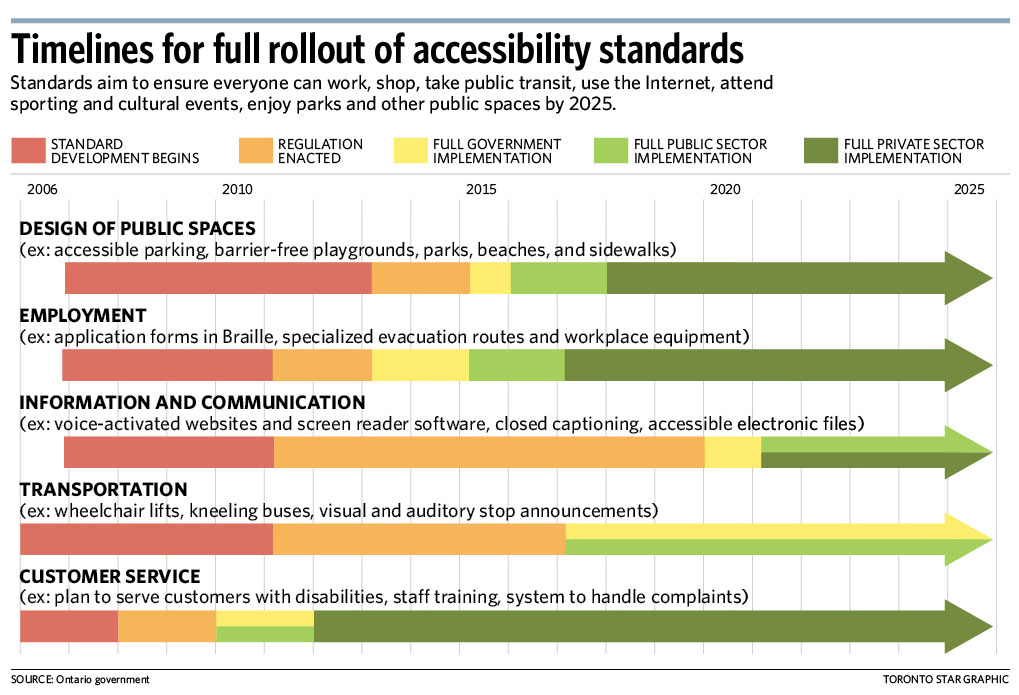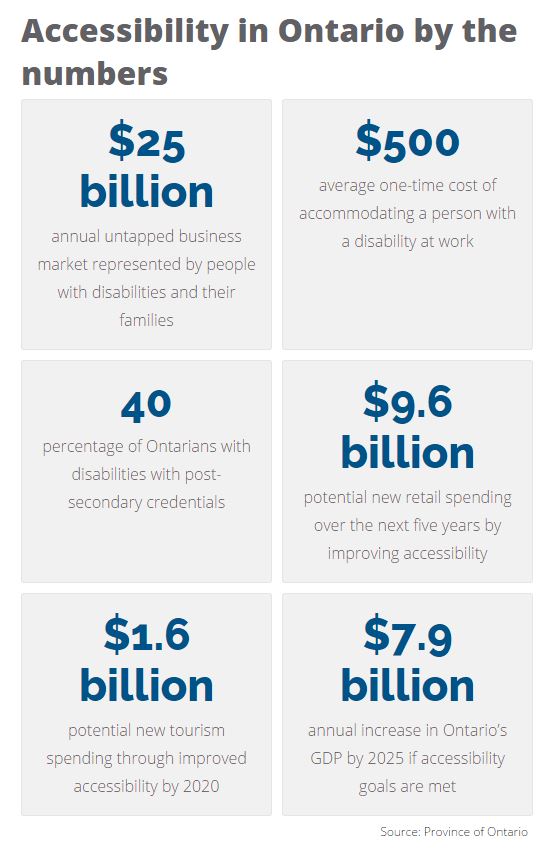
Ontario to crack down on accessibility violators
Ontario is cracking down on businesses in violation of accessibility laws.
TheStar.ca
June 3, 2015
Laurie Monsebraaten
Queen’s Park is beefing up compliance and enforcement measures in response to criticism that it has been treating accessibility scofflaws with kid gloves.
Starting next year, Ontario’s economic development ministry will move to double compliance audits to 4,000, or 1 per cent of Ontario’s 400,000 businesses.
Under the province’s Accessibility for Ontarians with Disabilities Act, businesses with 20 or more employees were supposed to have filed customer service plans with the government by the end of 2012. But to date, only about 40 per cent have submitted the necessary reports on how they accommodate customers with disabilities, train staff and receive customer feedback.
Accessibility advocates have criticized the government’s weak response to businesses that continue to flout the law. A recent legislative review of the act also urged the government to step-up enforcement.
The new enforcement measures are part of the Liberals’ 10-year accessibility action plan to be released Wednesday. It is aimed at ensuring the province’s 1.8 million people with disabilities can live, work and play to their full potential by 2025, as set out in Ontario’s ground-breaking 2005 accessibility act.
“Enforcement is part of our efforts to move towards greater compliance,” said Economic Development Minister Brad Duguid.
“We’re not here to pound on them. We’re here to work with them to actually build a stronger economy,” he said in an interview. “But we are going to enforce the regulations.”
To ensure the 1-per-cent target is reached, the ministry will hire an outside audit company to work with government staff. If successful, all future audits will be conducted by a third-party firm on behalf of the government, a ministry spokesperson said.
As recommended in February’s legislative review, the ministry will begin releasing annual compliance reports next year with information on complaints, fines and other enforcement measures along with action plans for improvement. (Fines for non-compliance range from $200 to $2,000 for individuals and from $500 to $15,000 for corporations.)
The government is also simplifying its complaint hotline to make it easier for the public to give feedback. New monthly reports to the minister’s office on complaints will ensure systemic problems are addressed promptly, officials say.
In addition to tougher enforcement measures, the ministry is announcing new initiatives “to promote a cultural shift” toward accessibility. They include a $1.8 million pilot project with the Ontario Chamber of Commerce to promote accessibility in the business community. Another $9 million will help businesses hire workers with disabilities and adapt their workplaces.
“If you make your buildings and your businesses accessible, you are going to tap into a very talented group of under-represented folks in the labour market who are going to be able to drive productivity,” Duguid said. “And it will open your door to a new customer base that might otherwise not be able to access your business.”

Key initiatives
Recruiting people with disabilities
Queen’s Park is partnering with the Ontario Chamber of Commerce to promote the business case for hiring people with disabilities and to spread the word about best practices. The $1.8 million one-year initiative aims to build employer awareness of government and community support available to help recruit and retain people with disabilities.
Innovations in accessibility
Ontario is developing a new certification program to promote excellence in accessible design and to recognize businesses and organizations that champion accessibility. Modeled on the prestigious LEED environmental ratings, the government will consult with industry, disability advocates, municipalities and non-profits to develop the voluntary certification program.
Financial help for hiring
A new Ontario Community Loans Program will give low-cost loans to small- and medium-sized business owners who hire and retain workers with disabilities. The interest rate will drop for each person who gets a job. The $4 million pilot project aims to support up to 500 businesses and hire up to 1,100 employees with disabilities within two years.
Creating employment incentives
Ontario will spend $5 million over two years to help employers who want to hire people with disabilities find qualified candidates for the job. The pilot project will include connecting employers with social agencies that train and support workers with disabilities.
New website for feedback
Ontario is launching a new website, similar to the popular TripAdvisor site, where residents can rate and give feedback on accessibility experiences and businesses can respond. The goal is to allow people to search for accessible goods and services in their area and to encourage businesses to improve customer service.

